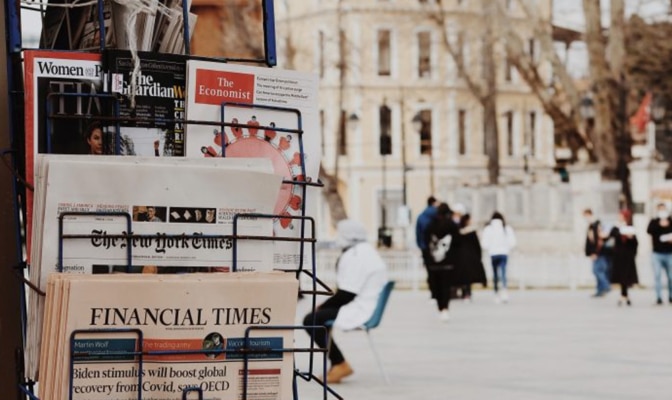Covid-19 coverage sparks spike in media audiences but advertisers head for the hills.
The coronavirus pandemic looks set to leave a permanent mark on the UK news media landscape. On the one hand, almost all news titles are witnessing a huge surge in readership as people trawl the web for the latest news on the outbreak. On the other hand, most titles have seen a dramatic slump in advertising revenues that is forcing them to look at hard choices and perhaps may even sound the death knell for some print titles.
Most journalists are, like the rest of the nation, currently working from home. Newsrooms are being run by skeleton staffs: key decision makers, such as editors and section heads and production people penning the attention- grabbing headlines.
In these unprecedented and fast-moving times our thirst for news is greater than ever, which means wherever they are journalists are working flat out, even if there’s only one story in town.
Broadcasters have been the biggest winners, with people tuning in for news bulletins and live updates from the Prime Minister and Chancellor et al. But the online versions of former print titles have not been far behind; The Daily Mail says it has seen a 19% increase in unique visitors this month, while The Guardian has reported more than 24 million unique visitors on March 15th, a new record by some way. Overall, the Guardian’s website has seen a 28% rise in traffic. This though is not necessarily supported by revenues.
More commercially encouraging is word from the FT’s new editor Roula Khalaf who says they have seen an ‘unprecedented spike’ in new readers, despite being behind a pay wall and closing most of its offices around the world. The Telegraph has seen a doubling of the number of people subscribing for its digital service, whilst more than 575,000 watched its ‘live stream’ of the Chancellor’s bail-out press conference.
The big unanswered question is whether the drastic drops in advertising revenue that the news media has seen – of perhaps 30-50% – will force others to follow the FT’s digital-first strategy or even drop print editions altogether. Many are pinning their hopes of salvation on the prospect of widespread public health notices that may now be taken out by government, particularly if they pay at or near full rate card.
As a former journalist, with ink in my veins, I hope this will be enough. My fear however is that, even if it does not spell the end for news organisations it could leave them looking very different.
Those hardest hit, to date, are the news outlets which cater for the vast swathes of commuters in the capital.
CityAM was the first to announce radical action. It ditched its 90,000-a-day print run, usually picked up by travellers at train and Tube stations, in favour of online only content. Jens Torpe, chief executive of CityAM, admitted that the switch online was necessary “to save the paper”.
“We would have been on the brink of collapse if we did nothing,” he added. It was a decision swiftly followed by The Evening Standard in London which decided to cut its print circulation from 800,000 copies to 500,000 a day. Journalists are working remotely and staff who usually hand out copies at Tube stations are being redeployed to post copies through people’s letterboxes in 25 areas around the capital.
Meanwhile, the bulk of journalists at most major newspapers, including The Times, The Sun, Daily Mirror and Daily Mail are also working remotely. For most it will, hopefully, be temporary disruption but for some it may be the dawn of a new era.
The Independent and its Sunday sister paper were the first national titles to cease print editions as far back as 2016.
Even before we had heard of the coronavirus, many other news organisations were already wrestling with how to balance the cost of producing both print and online editions, particularly with free web content, and competitors such as the BBC, giving people reasons not to buy newspapers.
The prospect of producing only digital content is appealing as, without the need for printing and trucks, drivers and newsagents for distribution, there would be a seismic change in the cost base of those businesses. For owners already looking to take advantage of these economic benefits, Covid-19 could just force their hand.
Either way, the current crisis makes one thing crystal clear: the government, businesses, and other organisations such as the NHS and schools will need to continue communicating, often via the media and, no matter what the channel, digital or print, companies such as H/Advisors Maitland will continue to play a part in helping them to do so.






